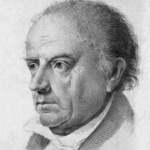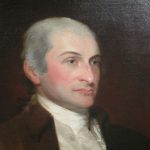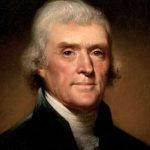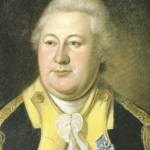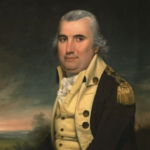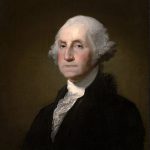What were the first great institutional conflicts that emerged within the American diplomatic system?
CHAPTER 2: “None Who Can Make Us Afraid”: The New Republic in a Hostile World, 1789-1801
 “Despite their partisanship and occasional excess, the Federalists skillfully guided the United States through a perilous era. Displaying opportunism and pragmatism in time of crisis, they exploited the European war to America’s advantage while scrupulously avoiding the full-scale involvement that would have been disastrous at this stage of the nation’s growth…The Federalists also bequeathed an enduring legacy of practice and doctrine. Inheriting a distrust of executive or legislative control of foreign policy, the Founders created a mixed constitutional arrangement with little basis in historical experience. Without precedent to guide him, Washington molded the vagaries of the Constitution into a workable system. The result was not a democratic foreign policy in any real sense of the word. Constitutional ambiguities would lead to executive abuses of power and intense executive-legislative conflict. But the system subjected foreign policy to the popular will to a greater degree than in other governments to that time.”
“Despite their partisanship and occasional excess, the Federalists skillfully guided the United States through a perilous era. Displaying opportunism and pragmatism in time of crisis, they exploited the European war to America’s advantage while scrupulously avoiding the full-scale involvement that would have been disastrous at this stage of the nation’s growth…The Federalists also bequeathed an enduring legacy of practice and doctrine. Inheriting a distrust of executive or legislative control of foreign policy, the Founders created a mixed constitutional arrangement with little basis in historical experience. Without precedent to guide him, Washington molded the vagaries of the Constitution into a workable system. The result was not a democratic foreign policy in any real sense of the word. Constitutional ambiguities would lead to executive abuses of power and intense executive-legislative conflict. But the system subjected foreign policy to the popular will to a greater degree than in other governments to that time.”
–George C. Herring, From Colony to Superpower: U.S. Foreign Relations Since 1776 (New York: Oxford University Press, 2008), 91-2.
- KEY TERMS & FIGURES: Farewell Address (1796) // Alien & Sedition Acts (1798) // John Adams // Alexander Hamilton
- Student Reflections (Fall 2020)
Farewell Address (1796)
“French meddling provoked a sharp presidential response in the form of Washington’s Farewell Address. Drafted partly by Hamilton, the president’s statement was at one level a highly partisan political document timed to promote the Federalist cause in the approaching election. Washington’s fervid warnings against the ‘insidious wiles of foreign influence,”and “passionate attachments” to “permanent alliances” with other nations unmistakably alluded to the French connection and Adet’s intrigues. They were designed, at least in part, to discredit the Republicans. At another level, the Farewell Address was a political testament, based on recent experience, in which the retiring president set forth principles to guide the nation in its formative years.” –George Herring, From Colony to Superpower, p. 83
Discussion Questions
- In this paragraph, Herring is referring to French meddling in the 1796 election. What insights for the present day, if any, do you see in the story of French interference in American politics during the 1790s?
- How would you assess the foreign policy accomplishments and setbacks of Washington’s two-term administration?
Additional Resources
- Farewell Address (text) (Avalon Project)
- Farewell Address (page images) National Archives)
- Summary & Context (Mount Vernon)
“One Last Time” from musical “Hamilton”
Performed at the White House in 2016, a musical rendition of Washington’s Farewell Address
Alien & Sedition Acts (1798)
“Adams’s more belligerent advisers saw in the conflict with France a splendid opportunity to achieve larger objectives. The war scare provided a pretext for the standing army Federalists had long sought. In the summer of 1798, Congress authorized an army of fifty thousand men to be commanded by Washington in the event of hostilities. Federalists in the cabinet and Senate also sought to rid the nation of recent immigrants from France and other countries who were viewed as potential subversives –and even worse as Republican political fodder– enacting laws making it more difficult to acquire American citizenship and permitting the deportation of aliens deemed dangerous to public safety. Striking directly at the opposition, the Federalists passed several vaguely worded and blatantly repressive Sedition Acts that made it a federal crime to interfere with the operation of the government or publish any ‘false, scandalous and malicious writings’ against its officials.” –George Herring, From Colony to Superpower, p. 87
Discussion Questions
- The late 1790s was a period of fierce partisan debate over immigration and its perceived threat to national security. What insights, if any, do you see in the story of the Alien & Sedition crisis for the politics of today?
- President John Adams eventually defused the crisis over Alien & Sedition and the Quasi War with France by forging a compromise with Napoleon in 1800. He claimed this as perhaps his greatest legacy as a statesman. Does Herring seem to agree? What is your assessment of Adams during this period?
Additional Resources
- Alien Enemies Act, Sedition Act with VA & KY Resolutions (Avalon Project)
- Alien & Sedition Acts (page images) (National Archives)
- Good summary of the four major 1798 laws: Alien Friends, Alien Enemies, Naturalization, and Sedition (Colonial Williamsburg)
KEY PLAYERS
John Adams (1735-1826)
 “If the price for peace and freedom of action was relatively low for the nation, it was high for the principled author and his party. Adams’s belated commitment to negotiations with France irreparably divided his party, sealing his defeat in the election of 1800 and contributing to the demise of Federalism. At least in retrospect, he insisted that the price was worth paying. ‘I desire no other inscription over my gravestone,’ he later wrote, ‘than: “Here lies John Adams, who took upon himself the responsibility for peace with France in the year 1800.”‘” (Herring, chap. 2, p. 91)
“If the price for peace and freedom of action was relatively low for the nation, it was high for the principled author and his party. Adams’s belated commitment to negotiations with France irreparably divided his party, sealing his defeat in the election of 1800 and contributing to the demise of Federalism. At least in retrospect, he insisted that the price was worth paying. ‘I desire no other inscription over my gravestone,’ he later wrote, ‘than: “Here lies John Adams, who took upon himself the responsibility for peace with France in the year 1800.”‘” (Herring, chap. 2, p. 91)
Alexander Hamilton (1755-1804)
 “Both [Thomas Jefferson and Hamilton] shared the long-range goal of a strong nation, independent of the great powers of Europe, but they approached it from quite different perspectives, advocating coherent systems of political economy in which foreign and domestic policies were inextricably linked with sharply conflicting visions of what America should be. Hamilton was the more patient. He preferred to build national power and then ‘dictate the terms of the connection between the old world and the new.’ Modeling his system on that of England, he sought to establish a strong government and stable economy that would attract investment capital and promote manufactures. Though expansion of the home market he hoped in time to get around Britain’s commercial restrictions and even challenge its supremacy, but for the moment he would acquiesce. His economic program hinged on revenues from trade with England, and he opposed anything that threatened it. Horrified at the excesses of the French Revolution, he condemned Jefferson’s ‘womanish attachment’ to France and increasingly saw England as a bastion of stable governing principles. More accurate than Jefferson and Madison in his assessment of American weakness and therefore more willing to make concessions to Britain, he pursued peace with a zeal that compromised American pride and honor and engaged in machinations that could have undermined American interests. His lust for power could be both reckless and destructive.” (Herring, chap. 2, p. 65)
“Both [Thomas Jefferson and Hamilton] shared the long-range goal of a strong nation, independent of the great powers of Europe, but they approached it from quite different perspectives, advocating coherent systems of political economy in which foreign and domestic policies were inextricably linked with sharply conflicting visions of what America should be. Hamilton was the more patient. He preferred to build national power and then ‘dictate the terms of the connection between the old world and the new.’ Modeling his system on that of England, he sought to establish a strong government and stable economy that would attract investment capital and promote manufactures. Though expansion of the home market he hoped in time to get around Britain’s commercial restrictions and even challenge its supremacy, but for the moment he would acquiesce. His economic program hinged on revenues from trade with England, and he opposed anything that threatened it. Horrified at the excesses of the French Revolution, he condemned Jefferson’s ‘womanish attachment’ to France and increasingly saw England as a bastion of stable governing principles. More accurate than Jefferson and Madison in his assessment of American weakness and therefore more willing to make concessions to Britain, he pursued peace with a zeal that compromised American pride and honor and engaged in machinations that could have undermined American interests. His lust for power could be both reckless and destructive.” (Herring, chap. 2, p. 65)
Other Key Players, Witnesses, or Examples
- Thomas Cooper
- John Jay
- Thomas Jefferson
- Henry Knox
- Charles C. Pinckney
- George Washington

